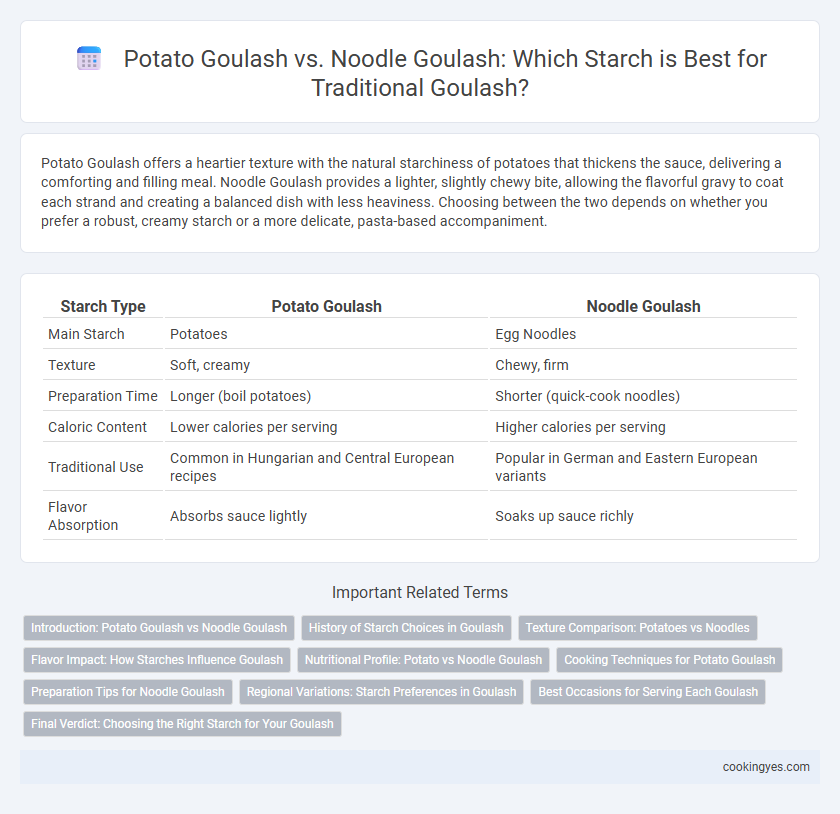Potato Goulash offers a heartier texture with the natural starchiness of potatoes that thickens the sauce, delivering a comforting and filling meal. Noodle Goulash provides a lighter, slightly chewy bite, allowing the flavorful gravy to coat each strand and creating a balanced dish with less heaviness. Choosing between the two depends on whether you prefer a robust, creamy starch or a more delicate, pasta-based accompaniment.
Table of Comparison
| Starch Type | Potato Goulash | Noodle Goulash |
|---|---|---|
| Main Starch | Potatoes | Egg Noodles |
| Texture | Soft, creamy | Chewy, firm |
| Preparation Time | Longer (boil potatoes) | Shorter (quick-cook noodles) |
| Caloric Content | Lower calories per serving | Higher calories per serving |
| Traditional Use | Common in Hungarian and Central European recipes | Popular in German and Eastern European variants |
| Flavor Absorption | Absorbs sauce lightly | Soaks up sauce richly |
Introduction: Potato Goulash vs Noodle Goulash
Potato Goulash incorporates hearty, tender potatoes that absorb the rich, paprika-spiced sauce, providing a creamy texture and substantial flavor that complements the dish's robust meat and vegetable base. Noodle Goulash features egg noodles or spaetzle, offering a lighter starch option with a slightly chewy bite that soaks up the savory gravy while balancing the dish's richness. Both starch choices play a crucial role in defining the overall mouthfeel and cultural variations of traditional Central European goulash recipes.
History of Starch Choices in Goulash
Potato goulash traces back to rural Central European traditions where potatoes were a staple starch, valued for their availability and ability to absorb rich paprika-based sauces. Noodle goulash emerged in urban settings, reflecting the influence of Central European pasta varieties like spatzle, favored for their light texture and ease of preparation. Both starch choices highlight regional agricultural patterns and cultural preferences influencing the evolution of goulash recipes over centuries.
Texture Comparison: Potatoes vs Noodles
Potato goulash offers a creamy and hearty texture, as the potatoes soften and partially dissolve into the sauce, enhancing the dish's richness. Noodle goulash provides a chewy, springy bite with noodles absorbing the savory flavors while maintaining structural integrity. The choice between potatoes and noodles impacts the overall mouthfeel, with potatoes contributing a velvety base and noodles adding distinct, tender strands that complement the robust goulash sauce.
Flavor Impact: How Starches Influence Goulash
Potato goulash imparts a creamy, earthy texture that absorbs the paprika-rich sauce, enhancing the dish's hearty flavor profile. Noodle goulash offers a lighter, slightly chewy contrast, allowing the savory broth and spices to shine through more distinctly. The choice between potato and noodles significantly influences the overall flavor balance and mouthfeel of traditional Hungarian goulash.
Nutritional Profile: Potato vs Noodle Goulash
Potato Goulash provides a higher content of vitamin C and potassium compared to Noodle Goulash, supporting immune function and electrolyte balance. Noodle Goulash delivers more complex carbohydrates and protein, contributing to sustained energy and muscle repair. Both starch bases offer distinct nutritional benefits, with potatoes favoring micronutrient density and noodles emphasizing digestible energy.
Cooking Techniques for Potato Goulash
Potato Goulash requires simmering diced potatoes slowly in the rich paprika-infused sauce to ensure they absorb flavors while maintaining a tender texture, which differs from Noodle Goulash where noodles are typically boiled separately and added just before serving. The key technique for Potato Goulash involves par-cooking the potatoes to prevent overcooking and disintegration during the lengthy stewing process. This method results in a hearty dish with potatoes that complement the savory paprika broth, creating a distinct texture and depth compared to the softer consistency found in Noodle Goulash.
Preparation Tips for Noodle Goulash
Noodle goulash requires al dente egg noodles, which should be cooked separately and added just before serving to prevent sogginess. To enhance flavor absorption, toss the cooked noodles lightly in butter or a small amount of goulash sauce before mixing with the stew. Draining the noodles thoroughly and serving immediately maintains the ideal texture and balance between starch and rich, paprika-infused sauce.
Regional Variations: Starch Preferences in Goulash
Potato goulash is favored in southern and western regions of Hungary where heartier, rustic starches complement the smoky paprika-infused stew. In contrast, noodle goulash, using egg or spaetzle-style noodles, is predominant in northern and eastern areas, reflecting Austro-Hungarian culinary influences with a lighter, more delicate starch base. These starch preferences highlight regional identities and ingredient availability, shaping the texture and dining experience of traditional goulash dishes.
Best Occasions for Serving Each Goulash
Potato Goulash pairs well with hearty fall and winter meals, offering a comforting starch that complements slow-cooked stews and rich sauces, ideal for family dinners and cozy gatherings. Noodle Goulash suits lighter, quick meals often enjoyed during spring or summer, making it a popular choice for casual lunches or festive celebrations where a softer, more versatile starch is preferred. Choosing between potato and noodle Goulash depends on the season, meal setting, and desired texture to best enhance the dish's flavors.
Final Verdict: Choosing the Right Starch for Your Goulash
Potato goulash offers a hearty, creamy texture that absorbs the rich paprika-infused sauce, enhancing the dish's rustic appeal and providing a comforting, filling meal. Noodle goulash delivers a lighter, more delicate starch option that complements the stew without overpowering the robust flavors, making it ideal for a balanced and slightly less dense dish. Final verdict depends on preference for texture: choose potato for richness and substance, or noodles for a subtle, softer starch balance in your goulash.
Potato Goulash vs Noodle Goulash for starch Infographic

 cookingyes.com
cookingyes.com